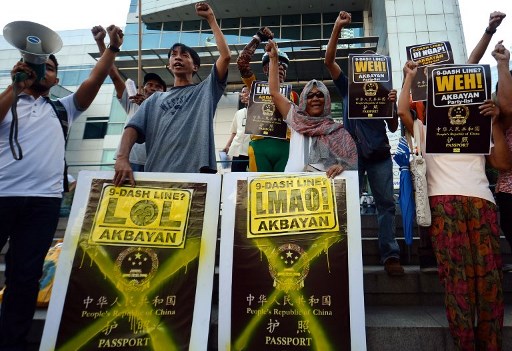The Philippines will start stamping Chinese passports bearing a map with the controversial 9-dash line, Presidential spokesperson Salvador Panelo said yesterday.
“Foreign Affairs Secretary Teodoro Locsin proposed to stamp the Philippine Visa on passports of Chinese nationals who wish to enter the country instead of the practice adapted before of placing it on a piece of paper. This was approved by the President,” Panelo said in a statement about a cabinet meeting held on Monday.
He also said that the Department of Justice (DOJ) will closely monitor the stay of Chinese tourists and will implement immigration measures if they exceed their allowable stay.
In 2012, the Philippines’ Bureau of Immigration ordered its personnel to stop stamping Chinese passports and instead mark the back page of a Chinese national’s visa application form, which should be attached to their passport upon arrival to the Philippines. This was in protest to China putting a map of the country on the travel document including the nine-dash line — a then-disputed area in the West Philippine Sea.
In 2016, an international tribunal in The Hague ruled in favor of the Philippines and concluded that China does not have rights to resources within the nine-dash line. However, China does not recognize this ruling and continues to claim the area.
“He said, ‘Approved. I am OK with that,'” Panelo said in English and Filipino during a press briefing yesterday about how Duterte agreed to the proposal.
He said that the new rule is meant to assert the Philippines’ ownership of parts of the West Philippine Sea, as the stamp to be used will show a map of the Philippines that includes areas claimed by China.
“The good thing I see there is [the stamp] will have the map of the Philippines where all our territory is included, even those that are disputed,” he said.
Locsin said in a tweet yesterday that the stamp would include the entire Philippine Exclusive Economic Zone.
The stamp has the map of the entire Philippine EZZ to its widest extent including Benham Rise along with other territorial claims. So tit for tat. https://t.co/gj1PK4Izrm
— Teddy Locsin Jr. (@teddyboylocsin) August 6, 2019
He also said that stamping passports instead of “slips of paper no one could keep track of” would allow the Philippines to keep track of Chinese visitors better.
“We will be able to keep track of Chinese nationals entering via visa from our consulates in China or visas upon arrival (after shorter vetting period)—hitherto stamped on slips of paper no one could keep track of. Now visas stamped on permanent Chinese passports—so we know all,” Locsin said.
We will be able to keep track of Chinese nationals entering via visa from our consulates in China or visas upon arrival (after shorter vetting period)—hitherto stamped on slips of paper no one could keep track of. Now visas stamped on permanent Chinese passports—so we know all. https://t.co/gj1PK4Izrm
— Teddy Locsin Jr. (@teddyboylocsin) August 6, 2019
According to Panelo, the stamping of Chinese passports will roll out within the year, as soon as a new protocol has been created.
He also said that President Rodrigo Duterte wants the visa process for Chinese visiting the Philippines to be reciprocated for Filipinos traveling to China.
At the moment, Chinese nationals are issued visas upon their arrival to the Philippines after passing a screening process by tour operators accredited by the Philippine government.
Filipinos tourists, however, need to first secure a visa from the Chinese Embassy in Manila before traveling to China. They will need to submit a travel itinerary, reservations for round-trip airline tickets and a hotel, and an invitation letter from someone in China, among other requirements.
Locsin is pushing for an end to issuing visas-upon-arrival, saying that “all visas should be issued by consular offices after vetting.”
This comes amid a rise in concerns about foreign nationals — mostly from China — working in the Philippines illegally.
Duterte has been criticized for his warming relations with China and how he has failed to implement The Hague’s ruling. Many also think that he has a defeatist attitude regarding the West Philippine Sea. In his State of the Nation Address last month, Duterte said: “If I send the Marines to drive away from the Chinese fishermen, I guarantee, none of them will come back alive. But let me assure you, the West Philippine Sea is ours, no ifs and buts. But we have to temper it with the reality we face today.”
However, he seems to have slightly changed his tune on the issue. During yesterday’s press briefing, Panelo said that Duterte plans to discuss The Hague ruling during his visit to China later this month.
“He (Duterte) said, ‘Remember that I said before that there will be a time when I will invoke the arbitral ruling? This is the time; that’s why I am going there.’ That’s what he said,” Panelo recalled.
How Durterte plans to bring up the issue and specifics on what he will discuss were not specified.





Reader Interactions